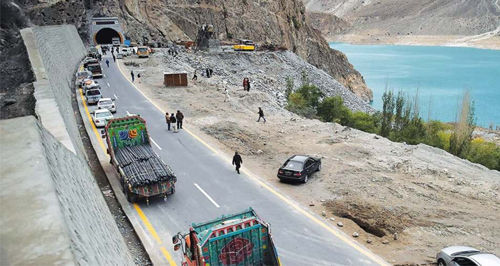Irfan Shahzad Takalvi
EVERY passing day in this time of pandemic is further highlighting the need for an even closer cooperation between Pakistan and China and making it evident that the mega China- Pakistan Economic Corridor (CPEC) is crucial for people of the two countries. As northern Gilgit-Baltistan region fast becomes Pakistan’s area infected the most with COVID-19, in terms of percentage of population, China’s Xinjiang assumes even more significance for this mountainous, less-developed territory in particular, and Pakistan at large. On March 28, mighty Karakoram Mountains witnessed another episode of traditional warmth between Pakistan and China as timely help from Xinjiang arrived at Khunjerab Pass, to be transported into Pakistani territory by army helicopters. Bracing the harsh weather, health and logistics’ workers and officials from both sides exhibited a high level of dedication to ensure the delivery of this utmost vital help from Xinjiang to Pakistan.
The help included ventilators, protective gear, testing papers and masks. This was on top of several plane-loads of crucial medical assistance from China landing at Islamabad and Karachi – and more being on the way, at that time. However, what was witnessed at Khunjerab Pass – the world’s highest land-crossing at 4733 meters altitude – underscores one of the most important aspects of bilateral ties between the two countries, the land linkages. Karakorum Highway (KKH), the world’s highest paved road has been in operation to connect Pakistan and China since its opening in 1980s, thus becoming a pioneering effort for revival of the Silk Road in contemporary times.
While the highway has already been upgraded significantly and is in the process of being further upgraded under CPEC, COVID-19 outbreak has made it clear once again that seamless land-linkage between Pakistan and China serves purposes more than just commercial trade.
However, as is well-known, CPEC is not merely a passage and has all-encompassing developmental projects; communications network, power generation projects, Gwadar Port and related infrastructure, Special Economic Zones (SEZs), agriculture and now increasingly social sector projects are being brought into its fold.
Gilgit-Baltistan – with now over 200 positive cases amongst its around 2 million population – becomes the territory most affected by COVID-19 in Pakistan when it comes to infections per million inhabitants. Media reports suggest that Urumqi’s help has enhanced the testing capacity and protection level of Gilgit’s medical workers significantly.
Just few weeks ago, some Western-funded NGOs and short-sighted political activists were engaged in propaganda that Pakistan should not open the land border with China for fear of spread of Coronavirus, from the Chinese. Now, the tables are turned and Pakistan actually needs smooth flow of goods and services across KKH, for GB in particular and for rest of the country too.
The head of Pakistan’s National Disaster Management Authority (NDMA) has already announced in media that a large walkthrough scanning machine is being transported from China, through this very land route. Such machine, he had shared in a recent press conference, can be delivered timely through only the land route. Earlier in March, Xinjiang regional government had already helped Pakistan with a sizeable quantity of masks.
It may be pointed out here that Xinjiang Uyghur Autonomous Region of China was and remains among the least impacted administrative units of the People’s Republic, since virus started spreading primarily in Hubei but also in other parts of China, towards the end of the last year.
Xinjiang, has helped not only Pakistan but also other countries bordering it are also in need of Chinese help, as they are now facing the gradual spread of COVId-19. In this way, Xinjiang has become instrumental for the broader region’s fight against this pandemic.
Xinjiang region alone has a Gross Domestic Product (GDP) larger than many of the nations of the world; and in terms of area it is twice that of Pakistan. The region’s economy is vibrant, fast growing and its infrastructure is developed much more than nations around. No wonders that its economic and commercial ties with regional countries have been seen as booming in recent years; so is the case with Pakistan.
Xinjiang and GB have a history of long-standing cooperation, be it border trade or visa-free limited ravel amongst the residents of two sides. Thousands of GB’s families have their livelihood linked to smooth flow of traffic through KKH. CPEC has injected a whole new spirit and vigour into this connection since 2013.
At the moment, a large number of GB’s residents are trapped due to lockdown in various parts of Pakistan, especially Karachi and the twin-cities of Rawalpindi and Islamabad, due to COVID-19 linked lockdowns and suspension of travel facilities. In this background, more of humanitarian and commercial cooperation between Xinjiang and GB may become necessary, in weeks and months ahead, and the effects and after-effects of pandemic would start to manifest.
Luckily, this is the period during which KKH remains open, from April 1 to September 30, every year. However, it is vital that the two countries accelerate their efforts to make KKH an all-weather road that remains operative throughout the year.
Not only smooth implementation of CPEC projects would be necessary for continuity of economic activities in GB, in an economy overall hit hard by the pandemic, but this is also the time to think fast on fostering further closer economic cooperation between the two sides. In weeks and months ahead, flow of medical and food supplies from Xinjiang to GB may particularly be required. Cooperation between public health administrations of the two regions may also be very useful for GB, particularly in pandemic control.
In case of CPEC, especially, the Special Economic Zone (SEZ) to be built in Gilgit Baltistan would enhance the economic activity of the region. It would also become an import impetus for optimal utilization of natural resources of this God-gifted territory. More jobs will be generated and overall quality of life as well as stakes of the local people will be developed.
(The author is founder of Eurasian Century Institute (ECI), Islamabad)










